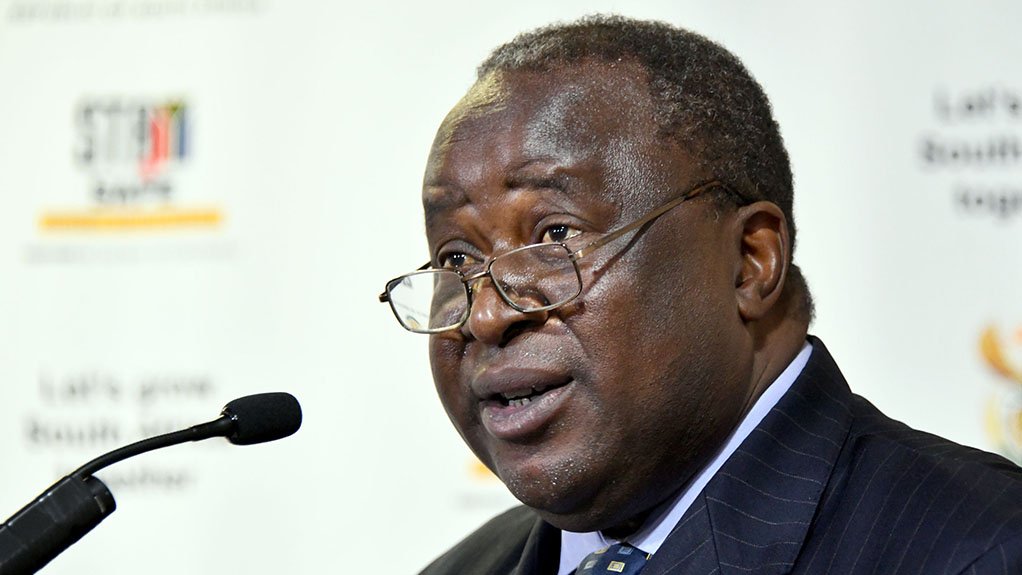PPE scandal highlights need to modernise public procurement – National Treasury
The National Treasury has halted the emergency procurement of personal protective equipment (PPE) and reverted to open procurement processes amid a normalisation of supply and growing allegations of corruption, which Finance Minister Tito Mboweni acknowledged on Wednesday had led to a breakdown of trust.
Addressing lawmakers virtually, Mboweni said that it had become clear that processes had to be tightened immediately and greater transparency introduced.
He indicated he would be insisting that the identities of all beneficiaries of PPE contracts be published, together with the reasons for their selection and with the names of losing bidders.
“We will also be interested to know the age of the companies that received contracts and when were they formed . . . and what was the case with politically exposed people (PEPs), we would like to know and deal with that.”
He did not provide a timeline for when the lists of successful bidders would be published, but described it as something that should be done “urgently”. He added that the lists should include the names of the shareholders of the winning bidders.
National Treasury director-general Dondo Mogajane announced that, from now onwards, PPE procurement should be compliant with all the existing normal instructions for procurement.
The National Treasury would also place a “lock” on absolute prices for all PPE and listed protective clothing and those seeking to buy such products at higher prices would have to seek permission.
National and provincial procuring institutions would also be required to provide the National Treasury with the names of all PPE and protective clothing appointed service providers for publishing on the National Treasury’s website.
Besides procurement instruction notes, the Auditor-General South Africa and the National Treasury would also be publishing ‘Preventative Control Guides’, to provide those officials responsible for procurement with a “toolkit” for identifying the risk of misappropriation, fraud and corruption ahead of a transaction.
AUTOMATION & MODERNISATION
Mogajane said the problems that had emerged with the PPE contracts had highlighted the need for the public procurement system to be urgently reviewed and modernised.
He said the process of drafting a new Procurement Bill was under way and appealed for lawmakers to expedite its passage through to legislation.
In addition, the Public Finance Management Act and the Municipal Finance Management Act would be reviewed, including the procedures for emergency procurement and how to strengthen the accountability of accounting officers.
In parallel, however, public procurement had to be modernised, including through automating systems in a way that enhanced due diligence and increased efficiency in the processing of requests.
He also indicated that it might be necessary to centralise future PPE procurement and facilitate such purchases by creating an information communication technology (ICT) platform that improved pricing visibility across all spheres of government.
Discussions on the introduction of such solutions were still to be held with the Department of Health, however.
The public sector, which procured more than R1-trillion of goods and services yearly, also had to draw in lessons from the way private companies went about their procurement.
“Automating and modernising our procurement system must be done urgently, and we are putting all efforts as National Treasury to design and develop, with the assistance of the private sector, an integrated ICT solution.”
Continuous information exchange between those responsible for prevention, investigation and prosecution was also required so that future preventative measures were informed by investigation lessons learnt and prosecution outcomes.
“What we can no longer keep quiet about is the participation of PEPs in public procurement. This will require a more stringent review, including the type of service being provided, the age of the business and what the business is all about.”
He said that it was time to “think outside the box” to ensure the public procurement system was made “fraud-proof”.
Article Enquiry
Email Article
Save Article
Feedback
To advertise email advertising@creamermedia.co.za or click here
Press Office
Announcements
What's On
Subscribe to improve your user experience...
Option 1 (equivalent of R125 a month):
Receive a weekly copy of Creamer Media's Engineering News & Mining Weekly magazine
(print copy for those in South Africa and e-magazine for those outside of South Africa)
Receive daily email newsletters
Access to full search results
Access archive of magazine back copies
Access to Projects in Progress
Access to ONE Research Report of your choice in PDF format
Option 2 (equivalent of R375 a month):
All benefits from Option 1
PLUS
Access to Creamer Media's Research Channel Africa for ALL Research Reports, in PDF format, on various industrial and mining sectors
including Electricity; Water; Energy Transition; Hydrogen; Roads, Rail and Ports; Coal; Gold; Platinum; Battery Metals; etc.
Already a subscriber?
Forgotten your password?
Receive weekly copy of Creamer Media's Engineering News & Mining Weekly magazine (print copy for those in South Africa and e-magazine for those outside of South Africa)
➕
Recieve daily email newsletters
➕
Access to full search results
➕
Access archive of magazine back copies
➕
Access to Projects in Progress
➕
Access to ONE Research Report of your choice in PDF format
RESEARCH CHANNEL AFRICA
R4500 (equivalent of R375 a month)
SUBSCRIBEAll benefits from Option 1
➕
Access to Creamer Media's Research Channel Africa for ALL Research Reports on various industrial and mining sectors, in PDF format, including on:
Electricity
➕
Water
➕
Energy Transition
➕
Hydrogen
➕
Roads, Rail and Ports
➕
Coal
➕
Gold
➕
Platinum
➕
Battery Metals
➕
etc.
Receive all benefits from Option 1 or Option 2 delivered to numerous people at your company
➕
Multiple User names and Passwords for simultaneous log-ins
➕
Intranet integration access to all in your organisation


















